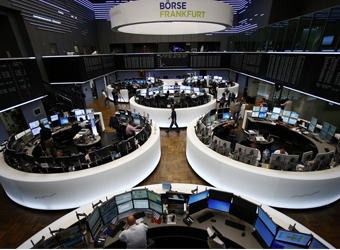Equities in Europe closed lower Monday afternoon amid weak volumes, and as investors digested fresh earnings.
The pan-European Stoxx 600 closed 0.66 percent lower with all sectors bar oil and gas in negative territory, having dropped throughout the day. The sluggish volumes were due to markets being closed in the United States, as well as Greater China and Mumbai.
Household goods was the worst performing sector, down 1.36 percent. Reckitt Benckiser reported higher fourth-quarter sales and raised its expectations for 2018 after going through tough times recently, Reuters reported. However, analysts see only a moderate potential for operating margin growth. As a result, the stock closed the day’s trading at the bottom of the European benchmark, down 7.5 percent.
Autos closed 1.29 percent lower. It was dragged lower throughout the day by news that carmaker Daimler may have used software to cheat in diesel-emission tests in the U.S. The stock dropped over 2 percent.
Also down over 1 percent was the healthcare sector, which closed trade negatively to the tune of 1.22 percent.
At the same time, a survey also showed Monday morning that British households have become more gloomy about their finances. IHS Markit’s household finance index hit a seven-month low, which also impacted views on the household goods sector.
In other corporate news, Deutsche Bank was the best performing banking stock, finishing the session up by over 2 percent after Bank of America Merrill Lynch raised its outlook on the stock and its target price.
It was announced Monday afternoon that euro zone finance ministers had given their support to Spanish Finance Minister Luis de Guindos to become the next vice president of the European Central Bank (ECB).
De Guindos was the clear frontrunner after his only opponent, Irish central bank Governor Philip Lane, withdrew his candidacy earlier Monday afternoon. This is one of four changes in the executive board of the ECB, which has only six members, taking place before the end of next year.
The institution is expected to make its final decision on the position in late March.
In the euro zone, new data showed the adjusted current account surplus narrowed in December to 29.9 billion euros ($37.09 billion) from 3.0 billion euros a month ago. Source: CNBC
Source: CNBC


